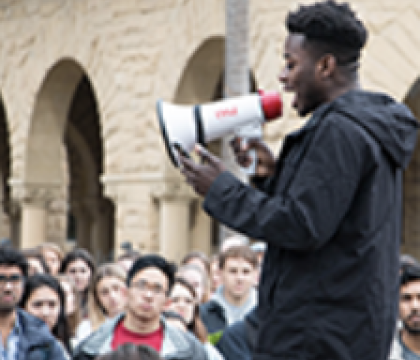Graduate Community-Based Research (GCBR) Fellowship 2021
GRADUATE COMMMUNITY-BASED RESEARCH (GCBR) FELLOWSHIP PROGRAM
The Graduate Community-Based Research Fellowship is a pilot program designed to support graduate students in becoming social change leaders in their respectives fields through practical community-based research experience. Producing scholarship that more explicitly engages communities and benefits the public enables graduate students to truly become leaders in their respective fields – in both their fields of scholarship, and in applying scholarship to fields of practice.
This program will support graduate students in actualizing a community-based research project and translating their research into social change approaches and strategies. Such partnership enriches graduate students’ research, as they benefit from the expertise of communities most impacted. At the same time, community-based organizations benefit from the research expertise and experience of graduate students.
Community-based research (CBR) is defined as "a partnership of students, faculty, and community members who collaboratively engage in research with the purpose of solving a pressing community problem or effecting social change" (Community-Based Research and Higher Education, Strand et al., 2004, p.3). CBR is a method of conducting academic research that 1) relies on cooperation and communication between all research partners; 2) validates multiple sources of knowledge; 3) promotes the use of multiple methods of discovery; 4) pursues diverse means for disseminating research findings; and 5) includes a commitment to some level of social action. In the ideal CBR project, academic scholars work in collaboration with community partners at every stage of the research process. Applications must be submitted by a graduate student of the research team; community partners should be actively consulted and included in the research design process. Students who are awarded GCBR fellowships are required to enroll in the spring course URBANST123B (CSRE146B) : Approaching Research in the Community - Design and Methods, which will introduce students to the principles and practices of community-based research, and further develop and support students as social change leaders.
Graduate fellows are eligible for up to $5,000 in supplemental funding for half-time summer research. Stipends can be used for both project and living expenses. Six graduate fellows will be selected—three from any field, and three with a research focus on ethics, science, and technology. Proposals with a focus on projects that advance social and racial justice will be privileged.
Proposal requirements include:
-
A completed application that:
- presents a well-defined research project that warrants a community-based research approach,
- incorporates best practices and principles of community partnerships
- clearly addresses a social justice issue, benefits community partners, and/or creates positive social change
- extends beyond research to engage in social action
- includes a remote project plan (all projects will be remote until public health conditions improve, and in accordance with university guidelines)
- Community partner support for the research project, in the form of a letter from the community partner(s) indicating their interest in the partnership and how the research meets their needs. Letters should be uploaded via this form link. (Please make sure your recommender is logged in to google drive to access the form).
- A faculty mentoring plan (webform), filled out and submitted by a faculty member, that describes how they will support/mentor the student in the time before, during, and after the summer research. Please share this form link with your faculty sponsor, and ask them to submit it by the application deadline. (Please make sure your recommender is logged in to google drive to access the form).
Applications are due February 24, 11:59pm.
REQUIREMENTS
Spring Quarter
Students awarded a fellowship are required to enroll in the spring quarter course, URBANST123B/CSRE146B: Approaching Research in the Community - Design and Methods to help prepare them for their community-based fieldwork experiences. In this course, student will be introduced to the principles and practices of community-based research. Graduate fellows will also discuss topics such as social change leadership, cultivating successful community partnerships, translating research for public scholarship, and disseminating research findings to the community. Fellows will also have the opportunity to workshop their work and receive critical peer feedback.
Summer Quarter
Students who participate in the GCBRF communicate monthly with the program administrator and student fellows to share their research progress and discuss readings that promote intellectual development and demonstrate connections between research and positive social change. Specific topics include the principles and practices of community-based research, methods for forging campus-community partnerships, and the ethical dimensions of data ownership and dissemination. Specific assignments include
- periodic check-ins with CBR coordinator, community partner organization supervisor, and/or faculty sponsor
- mid-point and final project report
- project (research, dissemination, and action) deliverables
Autumn Quarter
Fellows present their research and field questions during the annual Stanford Engaged Scholars Symposium in the autumn quarter. Faculty fellows and community partners are invited to the presentations as well.
Eligibility
- Funds may only support current Stanford graduate students (MA, MS, PhD, JD, MD).
- Graduate students from any field are welcome to apply. Three seats will be held for graduate students with projects that focus on the intersection of ethics, science, and technology.
- Projects with a focus on issues of social and racial justice will be privileged.
- Projects must include a remote contingency plan.
- Students earlier in their academic careers (in their respective degree programs) will be given priority though all students who meet the above criteria are eligible to apply.
